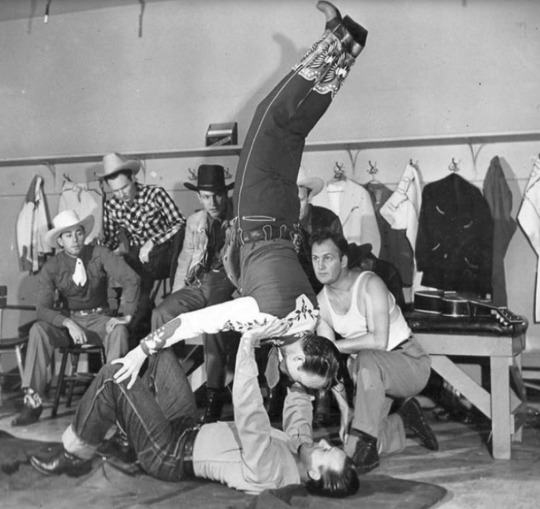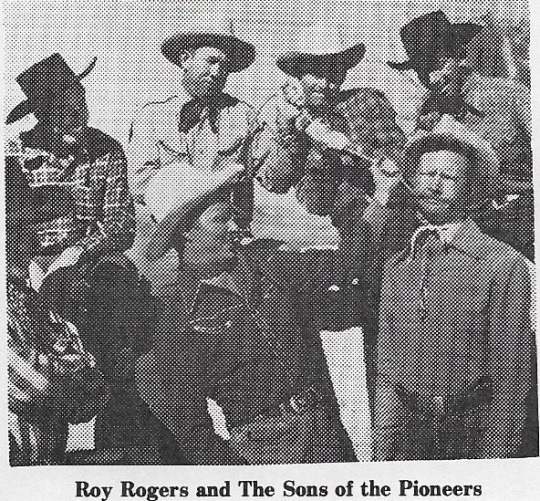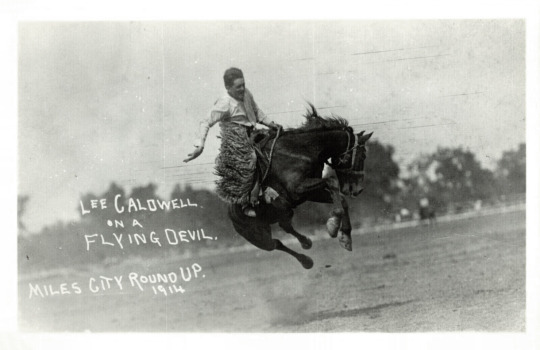#sons of the Pioneers
Explore tagged Tumblr posts
Text

Roy Rogers and Bob Nolan perform a balancing act while the rest of the Sons of the Pioneers look on
c. 1950s
18 notes
·
View notes
Text
Song of the day
(do you want the history of your favorite folk song? dm me or submit an ask and I'll do a full rundown)
youtube
"The Dying Cowboy" Cisco Houston, 1952
"The Dying Cowboy " or "Cowboys Lament" is based on an old sailors poem, written by Edwin Hubbell Chapin and published in 1839, "The Ocean Burial"


Edgar Allan Poe's "Southern Literary Messenger" vol V, pp.6l5-6l6, 1839
here's an example of the traditional song put to music by Eugene Jemison in 1954
by the 1880s, the lyrics had morphed into the famous cowboy song we all know and love, but it wasn't until 1910 that it was pared with its well-known melody by John Lomax in the album, "Cowboy Songs And Other Frontier Ballads" here (recorded 1942)
by far, the most interesting thing that happened to the song is that its meaning was reversed. in 1934, Carson Robison changed the lyrics and the song and titled it "Carry Me Back to The Lone Prairie" (recorded 1941) and several other contemporary famous country artists
like Sons of the Pioneers,
Riders in the Sky,
Gene Autry,
Johnny Bond,
and Roy Rogers.
covered this song.
this more Hollywood country version of the song changed the story away from the bitter toiling of cowhand workers and towards nostalgia for the West that fit right in with other popular country music of the 40s and 50s. At the same time, the song was covered by Cisco Houston, a leftwing activist and official Union Boy, among other progressives, as a criticism of working class conditions. This song is so utterly fascinating to me and the best way to visually and auditorially explain the historical split manufactured between folk and country.
#cisco houston#cowboy ballads#folk revival#folk#american folk#folk music#country#old country#traditional country#roy rogers#sons of the Pioneers#riders in the sky#gene autry#johnny bond#alan lomax#song of the day#folk singers#cowboy#Youtube
13 notes
·
View notes
Text
Cool, clear water...
1K notes
·
View notes
Text
youtube
sons of the pioneers -- blue prairie
0 notes
Text
Thing that Will Drive you Crazy, Will Drive you Insane:
0 notes
Text


sorta a redraw. nah basically a redraw. dumbass one and two, folks.
second image is based off of a little headcanon i got that theyre smoke buddies. kiyosumi (finally) chills out and laughs at everything and chiharu acts akin to a drug addicted paranoid schizophrenic. they are a great duo.
#best friends for life#pioneered and carried their friendship on MY back for years like sisyphus#worlds best worst friends ever#chiharu shiba#kiyosumi katou#katou kiyosumi#shiba chiharu#baki the grappler#baki hanma#baki son of ogre#baki dou#baki headcanons#anime#anime art#anime meme
35 notes
·
View notes
Text

1 note
·
View note
Photo
Now Skyball Paint was a devil's saint,
His eyes were a fiery red.
Good men have tried this horse to ride,
But all of them are dead.

ON A FLYING DEVIL
277 notes
·
View notes
Text
I think ZAKNAFEIN would appreciate a good, old fashioned blowjob. Like head against his thigh, suckling all sweet and lazy. He'll pet your hair and suck a breath between his teeth, he'll tell you how good you feel and you're so good at making him feel good. He's spent his whole life groveling to every drow woman in his life. Now he's got a pretty someone on their knees for him. The sight alone almost makes him come down your throat.
#C: Zaknafein#F: legend of drizzt#zaknafein do'urden#legend of drizzt#Legend of drizzt imagines#Zaknafein imagines#Zaknafein imagine#Zaknafein/reader#Zaknafein x reader#Zaknafein smut#I might be pioneering some of these tags#Lmao I love his middle aged half updo wearing ass#And I love his son so what does that say about me
9 notes
·
View notes
Text

42 notes
·
View notes
Text
why the fuck is my autistic ass getting into percy jackson literally 7 years too late. brother i’m almost an adult. i just bought the entirety of the heroes of olympus and i can’t wait to read it. what the fuck
#anyways if i was in percy jackson i’d be a son of ares#i’d have an almighty crash out on ow at age 15 and finally get claimed by ares (he thought i was a pussy beforehand)#ares would be my dad bc he visited the uk 15 years ago bc he heard that british ppl love a scrap#and he fell in love w my mum after scrapping her after the footie or something (he pretended to support whatever team had the angriest#supporters at any given time)#i’d be one of the pioneering minds behind the great camp half blood computer lab opening of 2021#alongside an athena cabin and hephaestus cabin kid#so i can rage over ow ranked even while at camp#just 4 me#percy jackson
7 notes
·
View notes
Text
This was also always on the Opera Cowpokes bill.
youtube
14 notes
·
View notes
Text
Rewatching Prodigal Son while waiting for this melatonin to work. This show was borderline camp, given how unhinged Malcolm Bright was played, the bug eyes, the tieing to the bed, the outcrazing serial killers to catch them.... It was wild. A real shame, the cast had a lot of charm. I wish it had gotten one more renewal.
#rewatching prodigal son#not enough for a rec#but it is the high camp of the procedural genre#they leaned into all the whump tropes#so hard lol#how did they get Micheal Sheen and Alan Cumming on this show?#and Lou Diamond Phillips is an underrated legend tbh#a pioneer for indigneous/Latin rep
12 notes
·
View notes
Text
i am simply an Alive Bobby Nash Truther until the bitter end. they can have a live feed of the inside of that man’s coffin as his body decomposes in the corner of every single episode from here on out and i will continue to believe that he will rise from the grave and continue to live his best most chaotic life with his hot wife and his cringefail bisexual son assigned to him by the HR department at the LAFD and his beloved dear paramedic friends who come to him for life advice and his son in law/narrative parallel with extreme catholic guilt and a nobel prize for pioneering new batshit ways to repress emotions and discovering previously unknown stages of grief. it is what he deserves
#911 abc#bobby nash#bobby nash will rise from his tomb on the third day as is foretold idc idc#911 on abc#911 show
2K notes
·
View notes
Text
Ritchie Valens - La Bamba 1958
"La Bamba" is a Mexican folk song, originally from the state of Veracruz, also known as "La Bomba". The song is best known from a 1958 adaptation by rock and roll pioneer and forefather of the Chicano rock movement Ritchie Valens, which became a Top 40 hit on the US charts. Valens's version is ranked number 345 on Rolling Stone magazine's list of the 500 Greatest Songs of All Time. "La Bamba" has been covered by numerous artists, notably by Los Lobos whose version was the title track of the 1987 film La Bamba, a bio-pic about Valens; their version reached number 1 on many charts in the same year. Their music video won the 1988 MTV Video Music Award for Best Video from a Film.
"La Bamba" is a classic example of the son jarocho musical style, which originated in the Mexican state of Veracruz, and combines Spanish, indigenous, and African musical elements. "La Bamba" likely originated in the last years of the 17th century. The oldest known historical references come from the town of Alvarado, Mexico, where it apparently was performed with an atypically lively rhythm. The oldest recorded version known is that of Alvaro Hernández Ortiz, who recorded the song with the name of "El Jarocho". His recording was released by Victor Records in Mexico in 1938 or 1939, and was reissued on a 1997 compilation by Yazoo Records, The Secret Museum of Mankind Vol. 4.
Ritchie Valens learned the song in his youth. In 1958 he recorded a rock and roll flavored version of "La Bamba", originally released as the B-side of his number-two hit "Donna". His recording of the song was inducted into the Latin Grammy Hall of Fame and the Grammy Hall of Fame. On February 3, 1959, on what has become known as "The Day the Music Died", Valens died in a plane crash in Iowa, an accident that also claimed the lives of fellow musicians Buddy Holly and J.P. "The Big Bopper" Richardson, as well as their pilot. Valens was 17 years old at the time of his death. He was posthumously inducted into the Rock and Roll Hall of Fame, the Rockabilly Hall of Fame, the Native American Music Awards Hall of Fame, the California Hall of Fame, and has a star on the Hollywood Walk of Fame. In 2018, his version of "La Bamba" was selected by the Library of Congress for preservation in the National Recording Registry for being "culturally, historically, or aesthetically significant".
"La Bamba" received a total of 92,2% yes votes!
youtube
895 notes
·
View notes
Text

Graham Chapman was heading for a career as a doctor until he met John Cleese at Cambridge University in the late 1950s. The duo were both members of the Footlights theatrical club, where they began writing comic skits. This partnership eventually led to the creation of Monty Python’s Flying Circus in 1969.
Chapman was considered the most subversive of the Monty Python members. When he was asked why he parodied authority figures, he said:
"Because they don't know their fucking business."

Chapman said that when he realized he was homosexual, it was "an important moment in my life". He met David Sherlock, his long-term partner, in Ibiza in 1966. When they returned to London and soon lived in together. The next year, Chapman came out to friends John Cleese and Marty Feldman.

In 1971, Chapman and Sherlock met John Tomiczek, a 14-year-old runaway from Liverpool. They later spoke with Tomiczek’s father, who agreed to let the pair become his legal guardians. (In later years, Tomiczek would become Chapman’s business manager.)
Chapman was a vocal supporter of Gay Rights. In 1972, he publicly supported the UK Gay Liberation Front and helped fund the pioneering newspaper Gay News. The same year, Chapman became one of the first British celebrities to come Out to the public - during a television chat show (although some say he was drunk at the time).
Chapman drank alcohol heavily most of his life. He once described it as:
“(It) was for relaxation. But it became more of a necessity. Four pints of gin a day is really hitting the juice.”
In 1973, while on tour with Monty Python, Chapman missed cues to go on stage and suffered from DTs (shakes, shivers, and confusion), which could last days.
In 1975, the Python Team began developing the script for “The Life of Brian”. Chapman had been considered by the team to be the best actor of the bunch, so he was cast as Brian. At Christmas 1977, Chapman became increasingly concerned that his drinking would impact his performance as Brian, so he quit drinking and remained sober for the rest of his life.
After the film opened in 1979, Chapman said:
“I'm still rediscovering myself. I don't really know who I am.”
Chapman took up pipe smoking at 15, which became a lifelong habit. It would have serious repercussions. In 1988, Chapman had a routine dentist appointment. The dentist discovered what appeared to be a small tumour on one of his tonsils. He had a tonsillectomy, but a year later, it was discovered that the cancer had spread into his spinal column. He underwent chemotherapy and other procedures, but it was determined the cancer was inoperable. Chapman died in October 1989, survived by his partner, David Sherlock, and his adopted son, John Tomiczek.
Chapman died the night before a planned Monty Python 20th anniversary celebration on the BBC. Python member Terry Jones called it "the worst case of party-pooping in all history".
At Chapman’s memorial service, close friend and writing partner John Cleese said:
“I guess that we're all thinking how sad it is that a man of such talent, of such capability for kindness, of such unusual intelligence, should now, so suddenly, be spirited away at the age of only forty-eight, before he'd achieved many of the things of which he was capable, and before he'd had enough fun. Well, I feel that I should say, nonsense. Good riddance to him, the freeloading bastard. I hope he fries! And the reason I feel I should say this is he would never forgive me if I didn't, if I threw away this glorious opportunity to shock you all on his behalf. Anything for him, but mindless good taste."
#gay icons#John Cleese#graham chapman#Monty Python’s Flying Circus#alcoholic#Terry Jones#cancer#subversive#life of Brian#Gay rights
216 notes
·
View notes